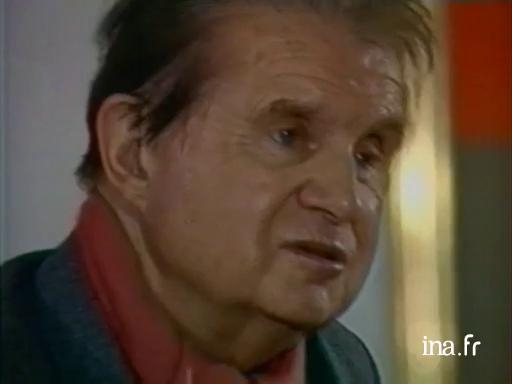Francis Bacon
There is a significant difference between realism and illustration.
Most people now make and have done illustrations, that's what we now call being an extra.
So there, that is done so much better by a camera or with cinema.
Interviewer
And as for you, your paintings?
Francis Bacon
I know.
Interviewer
And when all is said and done, you're inspired from deep within.
Francis Bacon
They don't say that it's much deeper.
I don't know because I never think.
I make the images, and that's it.
Others can tell me what they think of my paintings.
And what do they say?
Because, for me, when a painting is done, I leave it and I don't think about the painting anymore.
Interviewer
But when I said deeper, I was thinking of portraits such as those you've made of Michel Leiris, where we see that you've searched deep inside of him to paint him like that.
Francis Bacon
I know, I hope, but I don't know.
But I'm very happy if that's what you think.
Interviewer
I've always thought that your paintings were linked to that which is dramatic in our century.
Francis Bacon
Listen, I was born in Ireland in 1909.
So, we started out, we always had that war for the liberation of Ireland.
So that's it.
After that we had the war of 1914.
There.
And I spent my entire life as I did during these wars.
Interviewer
Of course, there was World War II after that.
Francis Bacon
Yes, so it plays a part in my sensitivity, surely.
Even if I'm not aware of it, it's there.
Interviewer
I understand.
Francis Bacon
We are surrounded by all of this violence.
Interviewer
I understand.
And do you think that your paintings help those who see them live through this violence?
Francis Bacon
Personally, I don't know.
They say that they're violent.
But I don't think so.
Think about what we do in life.
It's not... life is violent.
Interviewer
Yes.
But I wasn't saying that your paintings are violent.
I was saying that it could help those who see them live through this violence, and endure it.
Francis Bacon
That, I don't know.
Interviewer
You don't know?
Francis Bacon
No, I don't know.
Interviewer
But would you be happy if someone told you: "your painting helped me to get through"?
Francis Bacon
I'm not a doctor.
I'm not going to...
I'm not, how shall I say this... listen, I paint for myself.
I never thought about earning a living with my paintings.
I always thought...
that I would be forced to have some other profession.
So, I painted, I was hoping that they would get out a bit.
Interviewer
But I know that you've destroyed many of your paintings.
Francis Bacon
Yes, but not enough.
Interviewer
So then, as a painter, you're very difficult and you have very high standards for yourself.
Francis Bacon
You have to...
You know, I think that with painting, it's what is known as creation, it's a source of criticism.
The best creators are usually also very good critics.
Interviewer
But I want to ask you this: this invention, for example, here I see that your characters seem to have come from extraordinarily bright backgrounds, from orange backgrounds.
How did you obtain this?
You mentioned that they were pastels.
Francis Bacon
They were made from pastels.
But, you know, Van Gogh spoke about this problem in one of his letters.
He said: "You know, for realism, you have to tell lies".
And in lies, we think that we're going to get to a much closer realism than through illustrations.
Interviewer
Of course, in the end, you have to lie to get to the truth.
And the pastel here is a lie at the same time, because in daily life you would never find it, but at the same time...
Francis Bacon
No, but I used pastel here because this colour is impossible to find in oil or acrylic painting.
Interviewer
But it's also impossible to find in daily life, in everyday life.
And I want to ask you one other thing.
When we see your characters, we sometimes get the impression that they are pictures that moved.
As if you had... as if someone... do you consider it to be like a ruined photograph.
Does photography mean much to you?
Francis Bacon
Well, when I was much younger, I looked at pictures.
Now I don't think about pictures anymore.
I start a painting, that's all.
I'm going to do something.
And little by little, the images come.
Interviewer
Of course, they arrive.
Francis Bacon
Yes, usually by accident.
Interviewer
But that, that's also something else, I think, which is very important.
It's the surprise.
In your Triptych, we see very clearly, with Oresteia, that you trusted yourself with the surprise that the colours would provide on the canvas, am I right or am I mistaken?
Francis Bacon
No, but when I read Oresteia, it was a text that created the images, you know.
Interviewer
So it's with this text that you obtain them?
Francis Bacon
Yes, I get them from the text.
Because I like...
It's difficult to explain this to you because it might be because I was influenced by cinema and by the... what are they called, I don't know how to say this...
Interviewer
The overlapping of images in a film?
Francis Bacon
Yes, that's it.















